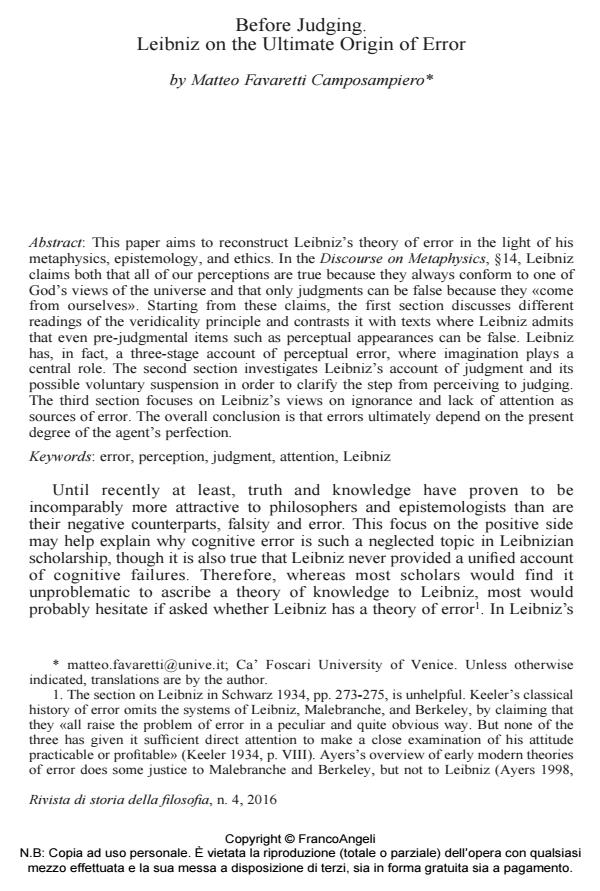Before Judging. Leibniz on the Ultimate Origin of Error
Journal title RIVISTA DI STORIA DELLA FILOSOFIA
Author/s Matteo Favaretti Camposampiero
Publishing Year 2016 Issue 2016/4 Language English
Pages 0 P. 727-744 File size 64 KB
DOI 10.3280/SF2016-004011
DOI is like a bar code for intellectual property: to have more infomation
click here
Below, you can see the article first page
If you want to buy this article in PDF format, you can do it, following the instructions to buy download credits

FrancoAngeli is member of Publishers International Linking Association, Inc (PILA), a not-for-profit association which run the CrossRef service enabling links to and from online scholarly content.
This paper aims to reconstruct Leibniz’s theory of error in the light of his metaphysics, epistemology, and ethics. In the Discourse on Metaphysics, §14, Leibniz claims both that all of our perceptions are true because they always conform to one of God’s views of the universe and that only judgments can be false because they «come from ourselves». Starting from these claims, the first section discusses different readings of the veridicality principle and contrasts it with texts where Leibniz admits that even pre-judgmental items such as perceptual appearances can be false. Leibniz has, in fact, a three-stage account of perceptual error, where imagination plays a central role. The second section investigates Leibniz’s account of judgment and its possible voluntary suspension in order to clarify the step from perceiving to judging. The third section focuses on Leibniz’s views on ignorance and lack of attention as sources of error. The overall conclusion is that errors ultimately depend on the present degree of the agent’s perfection.
Keywords: Error, perception, judgment, attention, Leibniz
- - Adams 1994: Robert M. Adams, Leibniz: Determinist, Theist, Idealist, Oxford University Press, New York-Oxford 1994.
- - Ayers 1998: Michael Ayers, Theories of Knowledge and Belief, in Daniel Garber and Michael Ayers (eds.), The Cambridge History of Seventeenth-Century Philosophy, vol. 2, Cambridge University Press, Cambridge 1998, pp. 1003-1061.
- - Belaval 1966: Yvon Belaval, Le problème de l’erreur chez Leibniz, «Zeitschrift für philosophische Forschung», XX (1966), 3-4, pp. 381-395. - Bolton 2011: Martha Bolton, Leibniz’s Theory of Cognition, in Brandon C. Look (ed.), The Continuum Companion to Leibniz, Continuum, London-New York 2011, pp. 136-158.
- - Calabi 1994: Clotilde Calabi, The Choosing Mind and the Judging Will. An Analysis of Attention, Lang, Frankfurt a.M. 1994.
- - Descartes 1964-1974: René Descartes, Oeuvres, ed. Charles Adam and Paul Tannery, 11 vols., Vrin-CNRS, Paris 1964-1974.
- - Everson 1990: Stephen Everson, Epicurus on the Truth of the Senses, in Id. (ed.), Epistemology, Cambridge University Press, Cambridge 1990, pp. 161-183.
- - Gassendi 1658: Pierre Gassendi, Opera omnia, 6 vols., Anisson and Devenet, Lugduni, 1658 (repr. Frommann-Holzboog, Stuttgart-Bad Cannstatt 1964).
- - Keeler 1934: Leo W. Keeler, The Problem of Error from Plato to Kant, Pontificia Universitas Gregoriana, Romae 1934.
- - Leibniz 1875-1890: Gottfried Wilhelm Leibniz, Die philosophischen Schriften, ed. by Carl Immanuel Gerhardt, 7 vols., Weidemann, Berlin 1875-1890.
- - Leibniz 1923: Id., Sämtliche Schriften und Briefe, Akademie Verlag, Berlin 1923ff.
- - Leibniz 1948: Id., Textes inédits d’après les manuscrits de la Bibliothèque provinciale de Hanovre, ed. Gaston Grua, 2 vols., Presses universitaires de France, Paris 1948.
- - Leibniz 1985: Id., Theodicy, trans. E.M. Huggard, Open Court, La Salle (Ill.) 1985.
- - Leibniz 1989a: Id., Philosophical Essays, trans. Roger Ariew and Daniel Garber, Hackett, Indianapolis (Ind.) 1989.
- - Leibniz 1989b: Id., Philosophical Papers and Letters, trans. Leroy E. Loemker, 2nd ed., Kluwer, Dordrecht 1989.
- - Levi 1929: Adolfo Levi, Il problema dell’errore nella filosofia del Leibniz, «Rendiconti del Reale Istituto Lombardo di Scienze e Lettere», LXII (1929), pp. 207-219.
- - LoLordo 2007: Antonia LoLordo, Pierre Gassendi and the Birth of Early Modern Philosophy, Cambridge University Press, Cambridge 2007.
- - Malebranche 1958-1990: Nicolas Malebranche, Oeuvres complètes, ed. André Robinet, 23 vols., Vrin, Paris 1958-1990.
- - Martin 1967: Gottfried Martin, Leibniz: Logik und Metaphysik, 2nd ed., de Gruyter, Berlin 1967.
- - Piro 1990: Francesco Piro, Varietas identitate compensata. Studio sulla formazione della metafisica di Leibniz, Bibliopolis, Napoli 1990.
- - Rateau 2008: Paul Rateau, La question du mal chez Leibniz. Fondements et élaboration de la Théodicée, Champion, Paris 2008.
- - Schwarz 1934: Balduin Schwarz, Der Irrtum in der Philosophie, Aschendorffschen Verlagsbuchhandlung, Münster i.W. 1934.
- - Spinoza 2002: Baruch Spinoza, Complete Works, ed. Michael L. Morgan, trans. Samuel Shirley, Hackett, Indianapolis-Cambridge 2002.
- - Suárez 1866: Francisco Suárez, Disputationes metaphysicae, 2 vols., Vivès, Paris 1866.
- - Taylor 1980: Christopher C.W. Taylor, “All Perceptions are True”, in Malcolm Schofield et al. (eds.), Doubt and Dogmatism. Studies in Hellenistic Epistemology, Oxford University Press, Oxford 1980, pp. 105-124.
- - Wilson 2008: Catherine Wilson, Epicureanism at the Origins of Modernity, Oxford University Press, Oxford 2008. - Zauderer-Naaman 1994: Noa Zauderer-Naaman, The Challenge Posed by the Problem of Error for Leibniz’s Metaphysics, in Albert Heinekamp, Isolde Hein (eds.), Leibniz und Europa, Leibniz-Gesellschaft, Hannover 1994, pp. 819-831.
- - Zauderer-Naaman 2001: Id., Leibniz and Descartes: Two Conceptions of Error and Rationality, in Hans Poser (ed.), Nihil sine ratione. Mensch, Natur und Technik im Wirken von G.W. Leibniz, Leibniz-Gesellschaft, Berlin, pp. 1412-1420.
Matteo Favaretti Camposampiero, Before Judging. Leibniz on the Ultimate Origin of Error in "RIVISTA DI STORIA DELLA FILOSOFIA" 4/2016, pp 727-744, DOI: 10.3280/SF2016-004011